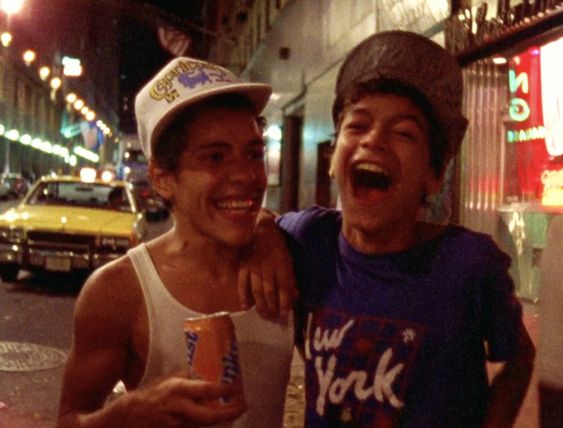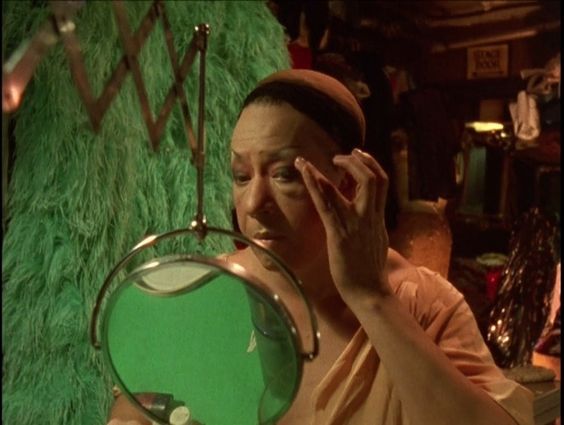I found myself at odds with Paris is Burning. Jennie Livingston’s vividly candid documentary utilizes the aesthetic of ballroom culture to the maximum, leaving the viewer unable to look away even if simply just for the immersion that handheld camera movement provides as Livingston showcases the fascinating characteristics that make up ballroom culture. The inclusion of deeply intimate interviews, case studies, and explanations of ballroom terminology provided a spectrum of emotion that affected the viewer, whether it be through profound sadness that arises upon being informed of Venus Xtravaganza’s death or through the momentary joy and subsequent laughter from the quote: “Shade is I don’t tell you you’re ugly but I don’t have to tell you because you know you’re ugly… and that’s shade.” Yet, behind all the glamour and unquestionable authenticity of its subjects, there is something disturbing about Paris is Burning. This underlying unsettlement does not stem from what we learn as a result of the documentary, but rather the ethics surrounding the production of the film itself.

Make no mistake, Paris is Burning is deeply informative, and in that regard, it satisfies the expectation that a documentary should teach the viewer something. If you come into this film without any previous knowledge of knowledge of ballroom culture, you will surely extract some sort of understanding of it as a whole or at the very least an understanding of its terminology. Livingston also satisfies the expectation that a documentary should be “realistic,” through the handheld camera movements mentioned above as well as through the subjects’ seemingly indifference towards the presence of a camera in the midst of balls. Above all, the raw emotion that we see in interviews with members of the ballroom scene strike us as “real” as interviewees experience happiness, nostalgia, and immense sadness as they discuss their thoughts and experiences as they relate to the ballroom scene. I mean, how can any viewer forget that aura of disappointment as Dorian Corey delivers a closing monologue that covers their disillusionment as member of the queer community, accentuated by a low-key lit, empty dressing room backstage.

Wait–what the fuck?
That’s the exact reaction I had when I fully processed the final scene of Paris is Burning, not necessarily because of Corey’s words, but because of the way Corey was portrayed by Livingston, and to an extent, how the queer community as a whole was portrayed by Paris is Burning. I found the documentary’s early highlights of the ballroom as generally agreeable; showcasing the resilience of queer people as they carve out a place of self-expression while also being informative of ballroom culture and its origins. The information provided and the way it was provided early on matched the energy of the subjects as confident, passionate, and optimistic. However, Livingston’s promising start makes the turn she takes in her portrayal that much more devastating. The final quarter of the film is overwhelmingly pessimistic, depressing, and disheartened. This is where my issues with Paris is Burning begin. If I am being perfectly honest, for Livingston to come document a scene that she does not partake in for the sake of documentary and proceed to mold its members into victims and broken spirits takes a special sort of audacity. To add salt to the wound, the choices she made regarding the mise-en-scene in the interviews to create a more intimate, solemn atmosphere (which greatly add to this “victim” narrative) clearly reflect her intent in constructing this portrayal. And that is what it comes down to: intent. For a documentary to display the resilience of the queer community and embraces its members (who all seem to be making progress towards improving their community and the queer community’s standing as a whole), then paint these same people as tragic figures caught in the past is simply morally wrong. To purposefully lower a group of humans, especially as an outsider, to a point where they seem to deserve infinite pity from us viewers just cannot be the way a proper documentary should function. Seeing the potential of Paris is Burning as a positive and realistic depiction of the queer community to an opinionated fetishization of the “tragic character” trope (not new to the queer community) was truly heartbreaking. As a viewer, we should question Livingston’s intention as she controls the portrayal of the queer community the same way we should question any authority that has the power to influence. In the face of all the genuine humans and identities shown throughout Paris is Burning, Jennie Livingston truly should have done better.
I would like to thank my peer, Meredith Farnsley, for her post on this subject as well. She has inspired a lot of the ideas that I have discussed, and I would recommend reading her posts for her additional thoughts!
I felt the same about many of her choices in the interviews. When she interviewed Dorian in his dressing room it felt extremely intimate and raw as I think a documentary should be but towards the end some of her shot choices began feeling predatory to me. When she shot Angie and Pepper in their bedrooms they were laying in their beds in a position that seemed very vulnerable to me and it just made me think of the violence they endure in the bedroom being sexualized and dehumanized by individuals such as the one who ended up murdering Angie. Looking at them in this way as a viewer made me feel if I was exploiting them and I’m unsure if seeing them as victims is a step to progress or a sign that the film is exploitative.